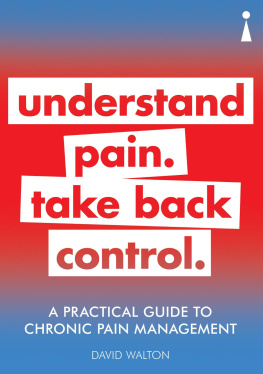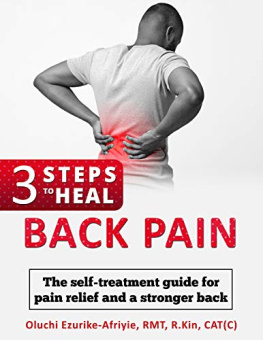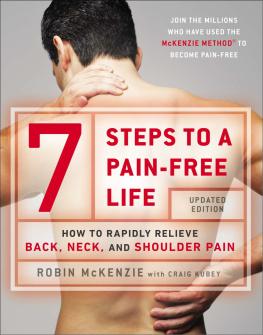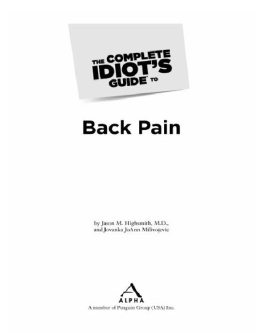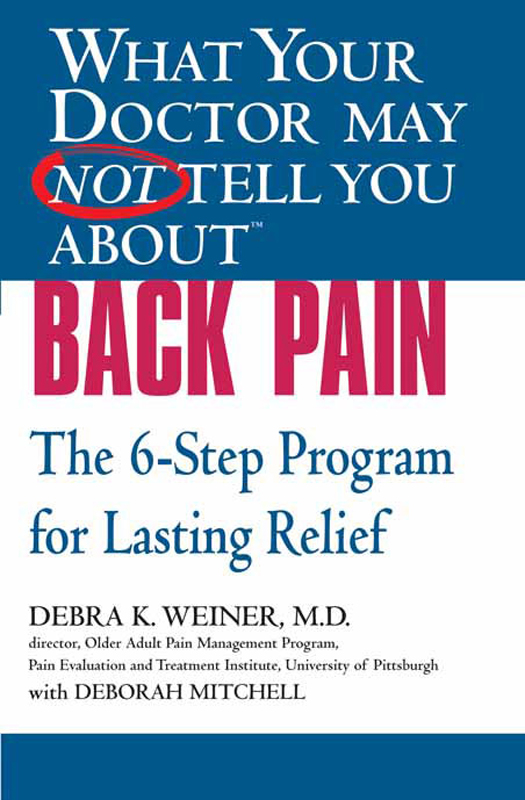Copyright 2007 by Debra K. Weiner, M.D., and Lynn Sonberg
All rights reserved. Except as permitted under the U.S. Copyright Act of 1976, no part of this publication may be reproduced, distributed, or transmitted in any form or by any means, or stored in a database or retrieval system, without the prior written permission of the publisher.
Warner Wellness
Hachette Book Group
237 Park Avenue
New York, NY 10017
Visit our website at www.HachetteBookGroup.com.
The Warner Wellness name and logo are trademarks of Hachette Book Group, Inc.
First eBook Edition: April 2007
ISBN: 978-0-446-19506-5
True or false?
Back pain is just a fact of life, and most people need pain medication to get relief.
False. Back pain can be prevented and/or relieved by following proven, integrative treatment programs, most of which do not require the use of pain medications or invasive procedures.
The only way to diagnose back problems is through X-rays, MRIs, and other expensive tests.
False. X-rays and other imaging tests are usually unnecessary and can produce false diagnoses. A thorough physical exam, combined with patient input, is usually all it takes to diagnose a back problem.
When you have a bad back, you should avoid physical activity.
False. The right kind of exercise program is key to your recovery from back pain. Other therapies, including pain medication, are supplemental.
Most back pain sufferers do not receive the treatment they need because it is never offered to them.
True. All too often a complaint about back pain is answered with a prescription for pain killers and a warning to be careful. To get the relief you need, you must educate yourself and take the initiative in developing your treatment and prevention program.
TAKE CONTROL OF YOUR LIFE AND
FIND LASTING RELIEF WITH...
WHAT YOUR DOCTOR MAY NOT TELL
YOU ABOUTBACK PAIN
It is with much love and appreciation that I dedicate
this book to my husband, Neal Samuels,
for his unconditional support.

T his book resulted from the guidance, tutelage, and support of a wide variety of individuals whose paths I have had the good fortune to cross over many yearsdepartment chairmen, teachers, patients, research study participants, family, and friends. Without them, its conceptualization and creation would not have been possible. I want to especially acknowledge Dr. Neil Resnick, my division chief at the University of Pittsburgh School of Medicine (Pitt); Dr. Mark Zeidel, former chairman of the Department of Medicine; and Dr. Eric Rodriguez who recruited me to come to Pitt in 1998. Their combined steadfast support and guidance has been an invaluable component of my career development.
Several colleagues provided critical feedback during the books development, and to them I am very grateful. Paula Breuer, consulting editor and the physical therapist at our interdisciplinary pain clinic, very carefully reviewed and revised the first four chapters. Her expertise on chronic pain is unique among the many physical therapists with whom I have worked, and she has been a motivating force behind my clinical, teaching, and research interests in chronic low back pain. Raymond Hanlon, the psychologist at our clinic, reviewed the chapter Minding Your Back and provided many useful suggestions. Dr. Natalia Morones expertise in mindfulness meditation was key in ensuring the relevance and accuracy of this section in chapter 5. I also need to acknowledge colleagues who have played a pivotal role in my career and without whom this book may never have been conceived. Thomas Rudy, psychologist and quantitative methods expert, and one of the founders of the University of Pittsburghs Pain Evaluation and Treatment Institute, has been a guiding beacon in my attention to detail and scientific thought process. Dr. Ronald Glick, a physiatrist at Pitt, initially inspired me to become an acupuncturist and changed the way I think about chronic pain.
The many patients with chronic low back pain for whom I have cared over the years and the participants in my research studies on chronic low back pain are truly the heart and soul of this book. While their stories have been included, the magnitude of their impact on me cannot be gleaned from the material that you are about to read. Chronic low back pain is extremely complex and poorly understood by the medical community. The patients for whom I have cared, however, understand it all too well, and through their understanding they have taught me about the aspects of this condition that are truly important.
Although I find the practice of medicine extremely rewarding, it is my wonderful family that gives my life depth and perspective. To my husband, Neal, and my children, Marc, Abby, and Rachel, thank you for giving me what no scholarly pursuit possibly could. Among my lifes accomplishments, you are the pinnacle.

B ecause youve picked up this book, I am assuming youre a member of a not-so-exclusive club, one of the millions of Americans who is needlessly suffering with chronic low back pain. Indeed, one reason I focus on low back pain in this book is that when we consider back pain in general, the vast majority of cases involve the lower spine rather than the upper or middle back, for reasons I address in great detail later in this book. Even more important, however, is a second reason: I believe Americans are suffering needlessly from this condition. I say this because my experience has shown me that if you are like most of the men and women in this category, you may not be benefiting from the many different integrative treatment options that can provide relief from your pain and disability. Why? Because these options were never offered or explained to you.
Instead, you and countless others probably have never undergone a thorough, comprehensive evaluation of your back pain. Whatever assessment you did experience was then likely followed by your being handed prescriptions for painkillers, sedatives, antidepressants, or muscle relaxants, and maybe a verbal reminder to do some back exercises and to be careful. You were led to believe that a combination of pharmaceuticals and tentative living would need to become a permanent part of your life if you want to control your pain or prevent recurring episodes. In your mind, you may half believe you will never get significant relief, while the other half of you may be desperately holding out hope that you will.
I believe you can get relief. My experience has shown me that relief not only is possible, but that significant relief can often be achieved with minimal or no medications and the bothersome side effects all too often associated with them. Ive found this to be true in people of all ages and from all walks of life, people who have wanted to take control of their back pain and their lives using techniques they have integrated into their lifestyles. So I wrote this book for youthanks to themto share with you how you can get relief, too.
Chronic back pain is a universal problem that crosses all age, ethnic, social, religious, and economic barriers. It has been called the most expensive benign condition in industrialized countries, costing about $100 billion per year in the United States: 20 percent of that in direct, medically related costs and 80 percent in lost productivity. In the United States, low back pain is second only to the common cold as a cause for lost work time. Every year, 3 to 4 percent of the population is temporarily disabled by back pain, and 1 percent of working-age individuals are completely disabled by it. Low back pain accounts for 19 percent of all workers compensation claims made in the United States. Among older adults, each year about 30 percent of those living outside institutions experience an episode of lower back pain, and 20 percent of them live with chronic pain.


